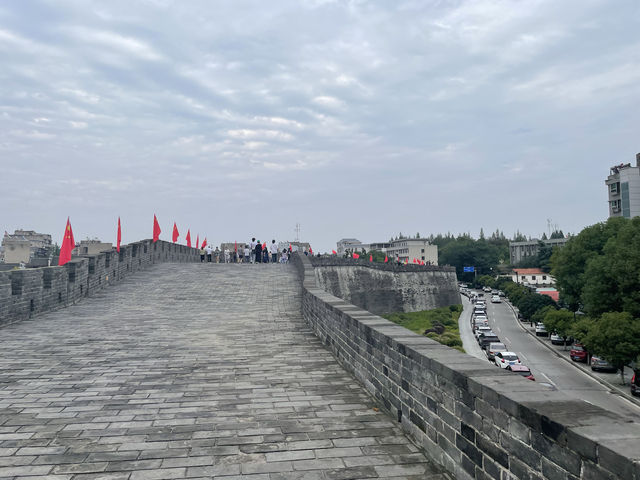Xiangyang Ancient City: The Echo of History
Joseph Whitman
Hubei Province Travel Guide, locals take you around
Wyatt.Morris@54
Infinite Charm--The Ancient City Wall of Xiangyang, Hubei
Z3phyrius_@byssus
Checking in at the ancient city of Xiangyang
HealthyHabits101
🌷 Exploring Tulips in Hubei 🌷
King Raph
Impressions of the Xiangyang Museum
ZACHARY TODD
Popular Trip Moments
🌷 Exploring Tulips in Hubei 🌷 | Xiangyang Ancient City: The Echo of History | Exhaustively compiled nanny-level guide for a one-day tour of Xiangyang Fantasy Valley | Traverse the sea of clouds and experience the fantasy - Xiangyang Yunhai Hotel (Fantasy Resort Branch of Overseas Chinese Town) | At the heart of the ancient city, a perfect blend of tradition and modernity | Impressions of the Xiangyang Museum | Had a great time at the Xiangyang Camping Campsite ceiling this weekend! | The ancient city of Xiangyang has a beautiful night view | Xiangyang | The most comfortable and worthwhile hotel to stay in | Migong Ancestral Hall, the calligraphy sanctuary | My first visit to Zaoyang was awe-inspiring due to the grandeur of Han City | Xiangyang Hotel Recommendations | Xiangyang Ancient City, the foremost city of China that embodies the essence of home and country, narrowness and righteousness | Sunshine and cherry blossoms are the copywriting of spring | Traveling through a thousand years, dreaming back to the Tang Dynasty: The Prosperous Tang City of Xiangyang | The first snow of Tang City travels afar to grace the mortal realm with a feast of startling beauty | Here is the legendary and romantic Xiangyang~ | Two-day tour of Xiangyang in winter, a weekend trip within Hubei Province | The boutique design hotel in Xiangyang is a healing fairyland where you won't be disturbed | Travelogue of Xiangyang | Luxury Through a Thousand Years: A Perfect Journey at Tang City Bodakerry International Hotel | Hubei's "off-the-beaten-path" summer retreat, where the summer temperature does not exceed 25 degrees | Xiangyang Yangchunmen Park | Enjoy the journey at Vienna International Hotel (Xiangyang Fanyue Center) | Xiangyang | The stunning appearance of Xi's Pond this autumn | The treasure hotel hidden by the Fengchu Bridge | The heart of Xiangyang Dongjin - Quanji Hotel (Dongjin Minfa Century Plaza Store) | Xiangyang Mi Gong Temple / Come to the quiet temple / See the calligraphy master / Feel the unity of landscape painting and calligraphy | I've traveled through time!? Seeking the dream of a prosperous era, I wander through the night in Tang City | Song of Vienna: The Luxurious Stopover of Xiangyang Journey - Vienna International Hotel
Popular Travel Types
Popular Destinations
Da Nang Travel | Kuala Terengganu Travel | Airport Frankfurt Area Travel | Desah Travel | Hamburg Travel | Jeddah Travel | Tianhe District Travel | Sihanoukville Travel | Artemida Travel | Jiangcheng District Travel | Zhoushan Travel | Nice Travel | Hanoi Travel | Athens Travel | Alabang Travel | Wulong County Travel | Changchun Travel | Princeton Travel | Ha Long Bay Travel | Demusa Travel | Periban Travel | Mulliken Travel | Douar El-Hlahla Travel | Kanhrawala Travel | Potrk Travel | Steuben Township Travel | Puerto Victoria Travel | Shakaman Travel | Purni Travel
Recommended Attractions at Popular Destinations
Bangkok attraction near me | Tokyo attraction near me | Manila attraction near me | Hong Kong attraction near me | Taipei attraction near me | Seoul attraction near me | Los Angeles attraction near me | New York attraction near me | Shanghai attraction near me | Kuala Lumpur attraction near me | Shenzhen attraction near me | Osaka attraction near me | Singapore attraction near me | London attraction near me | Guangzhou attraction near me | San Francisco attraction near me | Beijing attraction near me | Macau attraction near me | Bali attraction near me | Paris attraction near me | Ho Chi Minh City attraction near me | Orlando attraction near me | Jakarta attraction near me | Phuket attraction near me | Chicago attraction near me | Toronto attraction near me | Fukuoka attraction near me | Istanbul attraction near me | Dallas attraction near me | Cebu attraction near me
Popular Attractions
Aquaria KLCC | Yunhe Rice Terraces | Everland | Prince Kung's Palace Museum | Wuzhizhou Island | Yu Garden | Ocean Park Hong Kong | Universal Beijing Resort | Similan Islands | Bird's Nest (National Stadium) | Water Cube (National Aquatics Center) | Qinghefang Street | The West Lake | SM MOA Eye | Shanghai Wild Animal Park | Shantou Old Town | Golden Reel | Baiyun Mountain | Disneyland Park | Tiffany's Show Pattaya | Dolphins Bay Phuket | Millstone Golf Club | 埼玉スポーツセンター天然温泉 | Scala Theater | Honggang Pine | ELPRO | NingNan ShangYeJie | Aqua Expo | Escuela Clasica Lipizzana | Sport- en speelpleinen Bekaf
Popular Restaurants in Xiangyang
山丫丫·恩施土家菜(天元四季城店) | 海之味海鲜自助(沿江大道店) | DA KA SI BEI JIE DIAN | 昭明李记红糖饼(北街店) | 仓桥家(长虹路民发店) | 呷哺呷哺(襄阳民发商业广场店) | Parisi巴黎香(西街店) | 楚韵特色烤牛肉 | DQ | 朝天门火锅(时代天街店) | 蛙匠·炭烧牛蛙(民发广场店) | Qinzuiyuxia (liyelu) | 味之绝美蛙鱼头(立业路店) | 三道湘·辣椒炒肉(长虹路民发广场店) | 佰人王串串香火锅(人民广场店) | 蜀锦堂老坛酸菜鱼(襄阳武商汇店) | Xinmingtangdongzhishiniangao Hot Pot | 牛牛章鱼水煎肉(襄阳万达店) | 锦探鱼(长虹路民发广场店) | 3Q创意蛋糕店 | Bairenwang Chuanchuanxiang (liyelu) | 白石的深夜食堂(襄阳万达店) | 京味坊北京烤鸭•重庆火锅(天元旗舰店) | 烘焙时光蛋糕工作室(大南街店) | 东来顺(沿江大道店) | 蜀景印象新派火锅(春园路店) | 小龙坎火锅(万象城店) | 万喜乐西点屋 | DQ | 小肥羊(四季城店)
Payment Methods
Our Partners
Copyright © 2024 Trip.com Travel Singapore Pte. Ltd. All rights reserved
Site Operator: Trip.com Travel Singapore Pte. Ltd.
Site Operator: Trip.com Travel Singapore Pte. Ltd.




















